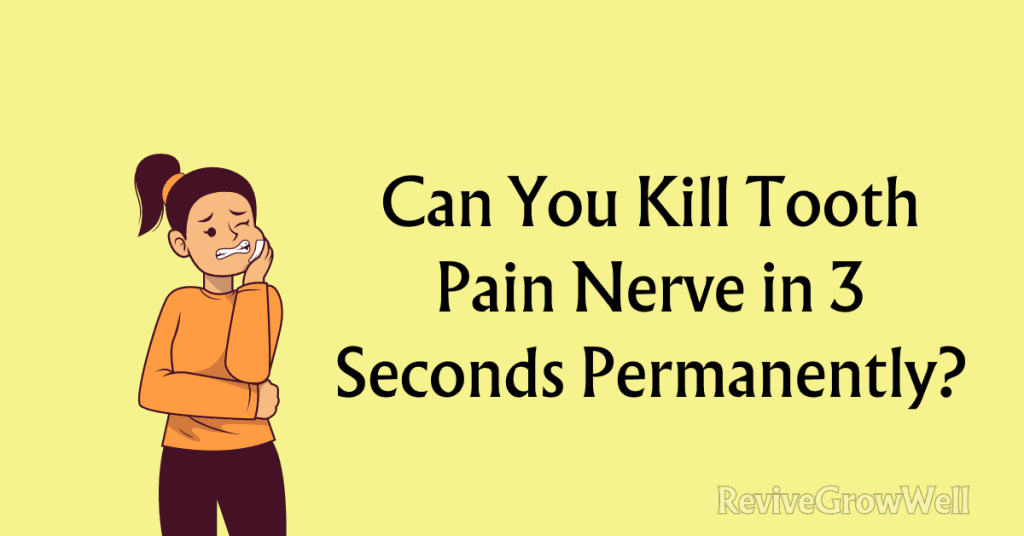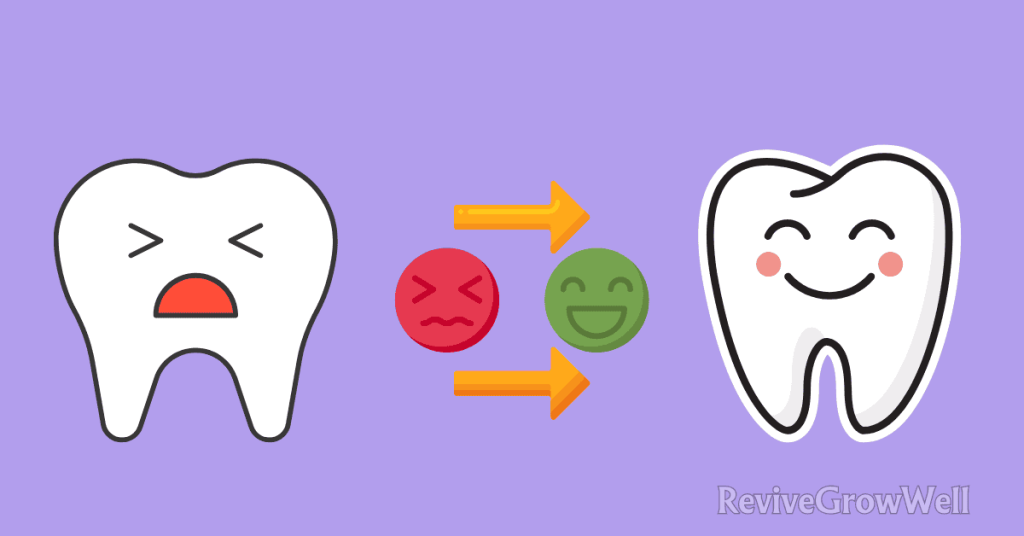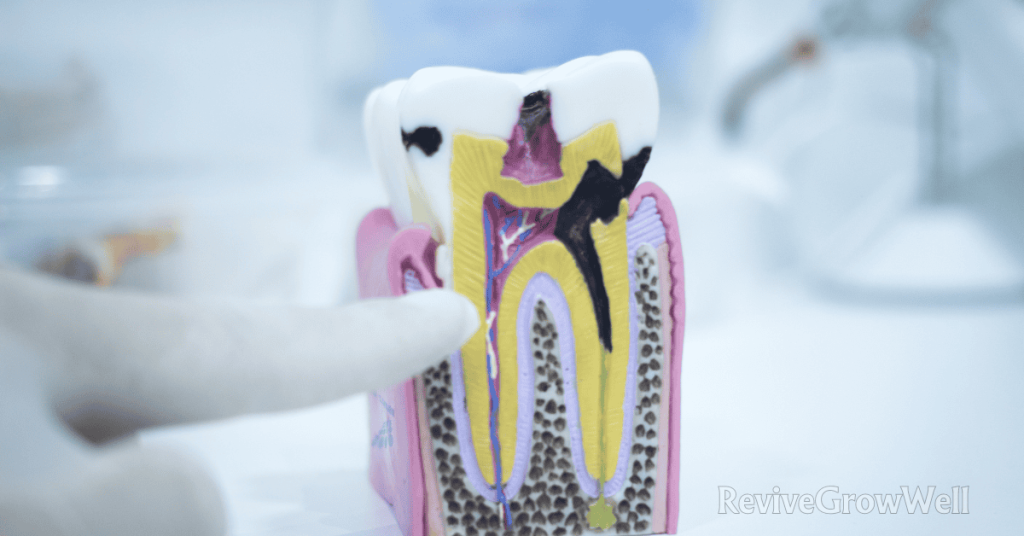Tooth pain can be one of the most intense discomforts we experience. When it strikes, we often look for instant relief. You’ve probably come across claims that you can “kill tooth pain nerve in 3 seconds permanently.” But is that really possible?
Let’s dive into this topic, debunk some myths, and explore effective ways to manage and eliminate tooth pain.
Can You Really Kill Tooth Pain Nerve in 3 Seconds Permanently?
The idea of killing tooth pain nerve in 3 seconds permanently is highly appealing, especially when you’re in severe discomfort.
However, it’s important to understand that while some methods may offer quick relief, they are not permanent solutions.
Let’s explore the reasons why.

Understanding Tooth Pain
Tooth pain often signals an underlying problem. Here are some common causes:
- Cavities: These are holes in the teeth caused by decay. Cavities occur when bacteria in your mouth produce acids that erode your tooth enamel. If left untreated, they can cause significant pain as they reach the inner layers of the tooth where nerves are located.
- Infections: Bacterial infections in the tooth or gums can cause intense pain. An abscess, a pocket of pus caused by infection, is particularly painful and can lead to serious complications if not treated promptly.
- Gum Disease: Inflammation or infection of the gums, known as gingivitis or periodontitis, can cause tooth pain and sensitivity. Gum disease is often the result of poor oral hygiene and can lead to tooth loss if not addressed.
- Trauma: Injury to the teeth or jaw, whether from an accident, sports, or biting down on something hard, can cause immediate and severe pain. This type of pain often requires prompt dental intervention.
Understanding the cause of your tooth pain is the first step toward finding the right solution.
Common Myths About Instant Tooth Pain Relief
The internet is full of quick fixes promising to “kill tooth pain nerve in 3 seconds permanently.” Unfortunately, these claims are too good to be true. Let’s address some common myths:
- Home Remedies for Instant Pain Relief: While home remedies like clove oil, garlic, or alcohol may provide temporary relief, they are not permanent solutions. These methods can help numb the pain momentarily but do not address the underlying issue.
- Pain Killers: Over-the-counter pain medications like ibuprofen or acetaminophen can reduce pain and inflammation, but they won’t cure the problem. Relying on painkillers without seeking professional help can lead to more significant issues over time.
- Magical Cures: There are numerous products and “miracle cures” advertised online that claim to eliminate tooth pain instantly. However, these often lack scientific backing and can be harmful if used improperly.
It’s essential to rely on accurate information and proven methods when dealing with tooth pain.
Effective Methods for Tooth Pain Relief

While there’s no magic cure to kill tooth pain nerve in 3 seconds permanently, several methods can provide temporary relief and help you manage the pain until you see a dentist. Here are some effective strategies:
- Pain Relievers: Over-the-counter medications like ibuprofen or acetaminophen can help reduce pain and inflammation. Always follow the dosage instructions and consult with a healthcare provider if you have any concerns.
- Topical Anesthetics: Products containing benzocaine can numb the area temporarily. These are available in various forms, such as gels, ointments, and liquids. Be cautious and follow the instructions to avoid any adverse reactions.
- Cold Compress: Applying a cold compress to your cheek near the painful area can reduce swelling and numb the pain. Wrap a few ice cubes in a cloth or use a cold pack, and apply it for 15-20 minutes at a time.
- Salt Water Rinse: Rinsing with warm salt water can clean the affected area and soothe inflammation. Mix half a teaspoon of salt in a glass of warm water and rinse your mouth thoroughly. This can help reduce bacteria and promote healing.
These methods can offer some respite, but they are not permanent solutions.
Permanent Solutions for Tooth Pain
To achieve lasting relief from tooth pain, it’s crucial to address the underlying issue. Here are some permanent treatments:
- Dental Fillings: If your pain is due to a cavity, a dentist can remove the decayed part of the tooth and fill it with a material such as amalgam, composite resin, or gold. This restores the tooth’s structure and function, preventing further decay.
- Root Canal: For infected or damaged nerves, a root canal procedure removes the affected tissue and seals the tooth to prevent further infection. This treatment can save a severely damaged tooth and eliminate the source of pain.
- Tooth Extraction: In severe cases where the tooth cannot be saved, extraction may be necessary. Removing the tooth can alleviate pain and prevent the spread of infection. Your dentist will discuss replacement options, such as dental implants or bridges, to restore your smile.
- Periodontal Treatment: For gum disease, professional cleaning and other treatments can restore gum health. Scaling and root planing, for example, remove plaque and tartar from below the gum line, allowing the gums to heal and reattach to the teeth.
These treatments require professional dental care, which is vital for resolving tooth pain permanently.
When to See a Dentist

If your tooth pain persists or worsens, it’s essential to see a dentist as soon as possible. Delaying treatment can lead to more severe problems and more complex procedures. Here are some signs that you should seek professional help:
- Severe Pain: Intense, unrelenting pain that doesn’t respond to over-the-counter pain relief requires immediate attention.
- Swelling: Swelling in your gums, face, or jaw can indicate an infection that needs prompt treatment.
- Fever: A fever accompanying tooth pain is a sign of infection and should be addressed by a dentist.
- Persistent Bad Breath or Taste: Ongoing bad breath or a bad taste in your mouth can signal an infection or other dental issues.
- Difficulty Chewing or Opening Your Mouth: If you find it hard to chew or open your mouth fully, it’s important to see a dentist to determine the cause.
Your dentist can accurately diagnose the cause of your pain and recommend the best course of action.
Tips for Preventing Tooth Pain
Prevention is always better than cure. Here are some tips to help you avoid tooth pain:
- Maintain Good Oral Hygiene: Brush your teeth at least twice a day with fluoride toothpaste, and floss daily to remove plaque and food particles from between your teeth.
- Regular Dental Checkups: Visit your dentist regularly for cleanings and checkups. This allows early detection and treatment of potential problems.
- Healthy Diet: Limit sugary foods and drinks, which can contribute to tooth decay. Eat a balanced diet rich in vitamins and minerals to support oral health.
- Avoid Tobacco Products: Smoking and using other tobacco products can increase your risk of gum disease and oral cancer. Quitting these habits can significantly improve your oral and overall health.
- Protect Your Teeth: Use a mouthguard if you play sports or grind your teeth at night. This can prevent injuries and reduce the risk of tooth damage.
By following these preventive measures, you can reduce the likelihood of experiencing tooth pain and maintain a healthy smile.
Conclusion
While the idea of killing tooth pain nerve in 3 seconds permanently sounds appealing, it’s not realistic. Temporary relief methods can help manage pain, but addressing the underlying cause is key to permanent relief. Always consult a dentist for an accurate diagnosis and effective treatment. Taking prompt action ensures your dental health and keeps those pesky toothaches at bay.
By understanding the myths and real solutions, you can make informed decisions about managing tooth pain. Remember, while quick fixes might offer temporary comfort, lasting relief comes from professional dental care. So, the next time you’re in pain, don’t hesitate to reach out to your dentist.
Maintaining good oral hygiene, visiting your dentist regularly, and addressing dental issues promptly are the best ways to prevent and treat tooth pain. Your smile is worth the effort!
If you found this article on how to kill tooth pain nerve in 3 seconds permanently helpful, please share it on social media to help others find relief from tooth pain.
FAQs about Killing Tooth Pain Nerve in 3 Seconds Permanently
1. Is it really possible to kill tooth pain nerve in 3 seconds permanently?
No, it is not possible to kill tooth pain nerve in 3 seconds permanently. While some methods can provide temporary relief, addressing the underlying cause of tooth pain requires professional dental treatment.
2. What are the most common causes of tooth pain?
Common causes of tooth pain include cavities, infections, gum disease, and trauma. Each of these issues requires different treatments to resolve the pain permanently.
3. What temporary methods can help relieve tooth pain quickly?
Temporary relief methods include taking over-the-counter pain relievers, using topical anesthetics, applying a cold compress, and rinsing with warm salt water. These methods can help manage pain until you can see a dentist.
4. What are the permanent solutions for tooth pain?
Permanent solutions for tooth pain involve treating the underlying issue. This can include dental fillings for cavities, root canal treatment for infected nerves, tooth extraction for severely damaged teeth, and periodontal treatment for gum disease.
5. When should I see a dentist for tooth pain?
You should see a dentist if your tooth pain is severe, persistent, or accompanied by swelling, fever, bad breath, or difficulty chewing. Delaying treatment can lead to more serious complications.
6. What are some common myths about instant tooth pain relief?
Common myths include the belief that home remedies like clove oil or garlic can provide permanent relief, that over-the-counter painkillers can cure tooth pain, and that there are magical cures that can instantly eliminate pain. These are all misleading and not effective for long-term relief.
7. How can I prevent tooth pain in the future?
Preventing tooth pain involves maintaining good oral hygiene by brushing and flossing regularly, visiting your dentist for regular checkups, eating a healthy diet, avoiding tobacco products, and using a mouthguard if you play sports or grind your teeth at night.
8. What should I do if home remedies and painkillers don't work?
If home remedies and over-the-counter painkillers do not alleviate your tooth pain, it is crucial to see a dentist. Persistent pain can indicate a more serious issue that requires professional treatment.
9. Are there any risks to using home remedies for tooth pain?
While some home remedies can provide temporary relief, they often do not address the root cause of the pain and can sometimes lead to further complications. It is always best to consult a dentist for proper diagnosis and treatment.
10. What is the role of a root canal in treating tooth pain?
A root canal is a procedure used to treat infected or damaged nerves inside a tooth. It involves removing the affected tissue, cleaning the inside of the tooth, and sealing it to prevent further infection. This can save the tooth and provide permanent relief from pain.
Discover Instant Oral Pain Relief Products
For instant relief from tooth pain, check out these highly recommended oral pain relief products. Click below to see prices and find the best solution to kill tooth pain nerve.
| Product | Name and Information | Price |
 4.5 | DenTek Instant Oral Pain Relief Best Seller Maximum Strength Kit for Toothaches | 50 Count Amazon's Choice | Check Price |
 4.7 | Orajel 4X for Toothache & Gum Pain Best Seller Severe Cream Tube 0.33oz- From Oral Pain Relief Brand Amazon's Choice | Check Price |
 4.3 | Boiron Hypericum Perforatum 30C Best Seller Homeopathic Medicine for Relief from Nerve Pain, Toothaches, Pain in Legs or Back, and Shooting Pains - 3 Count (240 Pellets) Amazon's Choice | Check Price |























